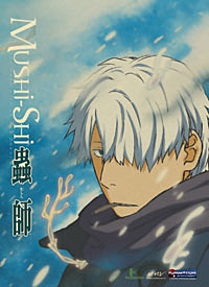Review
by Carl Kimlinger,Mushishi
DVD 1
| Synopsis: |  |
||
Ginko is a mushi-shi, a traveling healer who resolves problems caused by beings known as mushi. The mushi are things that occupy the gap between living beings and inanimate objects, very close to being manifestations of the life-force itself. Invisible to most, their effects are very, very real. In his travels Ginko helps a boy whose drawings come to life resolve his issues with his departed grandmother. He attempts to cure a girl whose over-sensitivity to light is caused by a mushi that lives in her eyes. He frees a snowy village from a plague of mushi that are consuming the village's sounds. He attends to a man who has prophetic dreams, and tries to free a young girl from her potentially lethal bond with a living swamp that is migrating to the sea. |
|||
| Review: | |||
Mushi-Shi is a rare animal indeed: a fascinating, unique viewing experience in a market flooded with strait-jacketed genre clones. To be sure, the wandering healer narrative has been used before, and the episodic structure and mystical touches recall works like Hell Girl and Requiem from the Darkness. However, those are but shallow comparisons for something that combines the naturalist's eye and hypnotic pacing of obtuse Russian auteur Andrei Tarkovsky with the lush art and ecological concerns of Hayao Miyazaki, and complements them with a quietly intense personal focus and engrossing mythology all its own. The tales it tells are simple; tales of loneliness, illness, despair, and sacrifice, ever so human and yet eerily supernatural. Each episode gently insinuates us into the lives and minds of its protagonists, evoking surprisingly strong responses to the tragedy, hope, and quiet triumph they experience. What makes Mushi-Shi unique, though, is the intertwining of these human tales with the world around them, with the boundless universe of nature, with the green growing things, animals, and strange, ethereal mushi. It's a relationship evoked by the way human structures—ancient, complex and organic in their own right—melt effortlessly into their surroundings—be they misty emerald forests, rocky seaside pine, or silent snow-swathed mountains—and by the incorporation of traditionally garbed humans, plants, and swirling mushi into a single, beautiful organic whole. The world of the mushi is a carefully realized one, based—despite their fantastical traits—in existing ecology and environments. They may eat sound and silence, be living swamps, or live in the gaping abyss behind a girl's ruined eyes, but the mushi's most prominent trait is the magic they impart to seemingly mundane objects—to mossy rocks, unfurling leaves, aged vault doors and wooden rooms. The haunting minimalist score, the natural yet evocative dialogue, the heartbreaking beauty of the art, the sparing use of flashy effects for the mushi, the simple yet beautiful characters, it all weaves a world that is as much a trance-like spell as it is a physical place. Funimation's dub preserves the feel and overall effect of the show. The actors, despite the majority of them playing one-shot single episode roles, do well with the emotions and complexities of their roles. Travis Wilmington does a fine job as Ginko, the only recurring character (besides the narrator). Unfortunately Funimation's freewheeling approach to re-writes is a strategy that works well in mediocre, poor, or similarly freewheeling shows, but has definite adverse effects when applied to something as carefully calibrated and sophisticated as this show is. The rewrite nails the emotional side, but falters occasionally with more intellectual passages when the paraphrasing loses the original meaning (i.e. Ginko's musings on the true meaning of the absolute silence experienced by a boy's mother just before death). Between the tour of the animation studio, a discussion between director Hiroshi Nagahama and lead actor Yuto Nakano, and an interview with Nagahama alone, there're nearly forty minutes of behind-the-scenes footage on this disc. It isn't the most entertaining set of extras—Nagahama makes for a rather boring interview—but it's quite informative, full of tidbits such as demonstrations of the extent of Nagahama's loyalty to the original manga, and a mention of chameleonic composer Toshio Masuda's decision to tailor-make different compositions for each episode's ending sequence (only one of the five versions on this disc is presented clean in the extras though). Also included is a clean version of the superb Simon & Garfunkel-esque opener. At once deeply human and utterly alien, mystical and earthily secular, Mushi-Shi beckons us—like the closing of second eyelids—to look at the world with new eyes, to go out and revel in the wonder of an eroded stone or the fractal veins of a leaf. It's enough to bring out the hippie in even the most hardened anime veteran. Images—a tidal wave of mushi pouring from girl's empty eye-sockets, a golden summer sky aswarm with flocks of feathery mushi—will haunt the mind's eye; emotions—the tender joy of another's company, the aching pain of loss—will linger in the heart. But the greatest achievement of all is to change, however briefly, our perception of the world around us. It's an end many strive for but few achieve, and Mushi-Shi does so without once allowing the effort to strain its calm, measured rhythm. |
| Grade: | |||
|
Overall (dub) : A-
Overall (sub) : A
Story : A-
Animation : A-
Art : A
Music : A
+ A nearly flawless evocation of a world of mystery, exquisite natural beauty, and honest humanity. |
|||
| discuss this in the forum (45 posts) | | |||
| Production Info: | ||
|
Full encyclopedia details about Release information about |
||